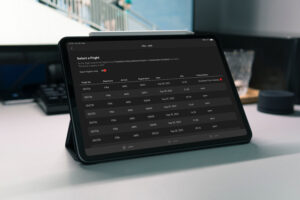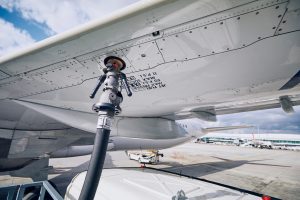Since I have the feeling that this topic is both relevant and similar to many airlines, I want to share the thoughts I’ve articulated during the discussions.
Let’s go back 15 years in time
But let’s take a step back first: When I started to work in the airline industry more than 15 years ago, the world was different. Then, data still was a rare good (and, by the way, expensive to store too). The internet was nothing compared to today. And we used to work with mainframe systems or Excel 98 to analyze data and create reports.
Anyhow —and that is quite interesting— the challenges an airline is tackling haven’t mainly changed. Back in those days, we tried to improve the on-time performance, increase the efficiency of processes, and ultimately aimed for improved customer satisfaction.
However, when comparing today’s technological possibilities to the ones in the ’00s, literally everything has changed. Most airlines possess more data than they can work with. New technical solutions are available, and today’s possibilities of the internet have changed everything.
The two fundamental technological mistakes I observe airlines are doing right now
So far, so good — here we go with the two fundamental mistakes I observed when discussing today’s tech world and opportunities, especially with mid-sized airlines.
And to mention that right at the beginning, the two mistakes go hand-in-hand. They fuel each other.
Work as they did 20 years ago
The first problem I see is that, even though airlines are drowning in data, they often try to handle data like they did 20 years ago. In so many cases, Excel still is the tool to use. And in many cases, the results are then transferred to Powerpoint to prepare PDFs sent out to relevant stakeholders finally.
And I already can hear some of you saying, “wait, we no longer use Excel but moved to Tableau or PowerBI.” That’s correct, but the thing is that you might have changed the tool; however, only a tiny portion of airlines have changed the way they approach data.
Overvaluing things they don’t understand
That brings me to the second fundamental mistake: Airlines (and people in general) overvalue things they don’t understand. What does that mean? Although the approach to tackle data hasn’t massively changed, many of them want to leapfrog the process and overvalue the benefits of tomorrow’s technologies: AI, predictive analytics, machine learning, etc.
Don’t get me wrong; I’m convinced about the power and impact AI, machine learning, and all the other stuff has on our everyday life. Nonetheless, I’ve only met a few people who deeply understand these topics and can create real business benefits out of them.
That’s why I’m always surprised when I present our solutions to potential clients, and the first question I get is, “are you utilizing AI or predictive analytics with your solution?”
My answer to this might be offensive, but I always use the following analogy: Look, if I used to be a car manufacturer. Why should I start selling spaceships to people that are only capable of riding a bike?
The technological opportunity airlines are missing
Working like in the ’00s and overvaluing the benefits of future technologies will lead to the results that you are missing a big opportunity. But, on the other hand, the options today’s technology is offering. And there are so many low-hanging fruits that can directly lead to business benefits and competitive advantages.
To get that punch line very, very clear:
Instead of relying on traditional approaches and overvaluing the unknown, you should go for ready-to-use improvements.
Let’s give you an example: I talk to many airlines that still (solely!!) create weekly operational reports that are sent out as PDFs via email. But, interestingly enough, quite often, these are the airlines that want to leapfrog and discuss AI and predictive analytics.
My advice to airlines is to avoid these two fundamental technological mistakes: Forget about this stuff and take the next logical and evolutionary steps first. Introduce real-time reporting instead of weekly reports. Go for seamlessly —across all devices— integrated solutions. Make use of push notifications. Just to mention a few opportunities.
Of course, these are only a few examples I’m personally dealing with every day. In other areas and for other cases, there are undoubtedly other examples that fit that picture.
What happens if you miss that opportunity? I firmly believe that utilizing data in the best way is the key differentiator. The airlines that play that game best will finally win. Full stop.





